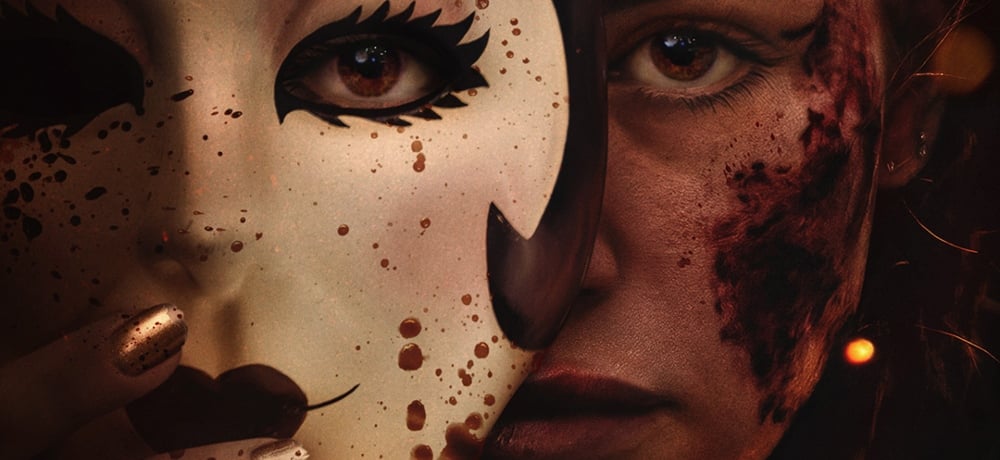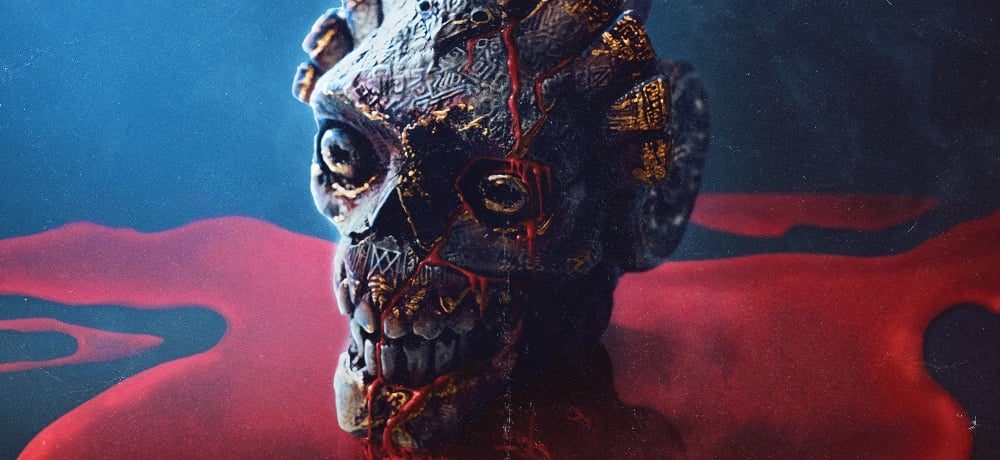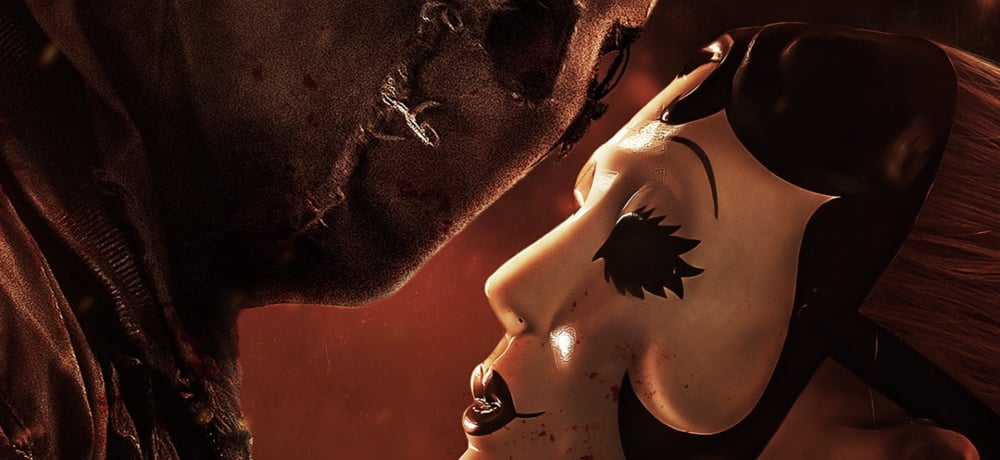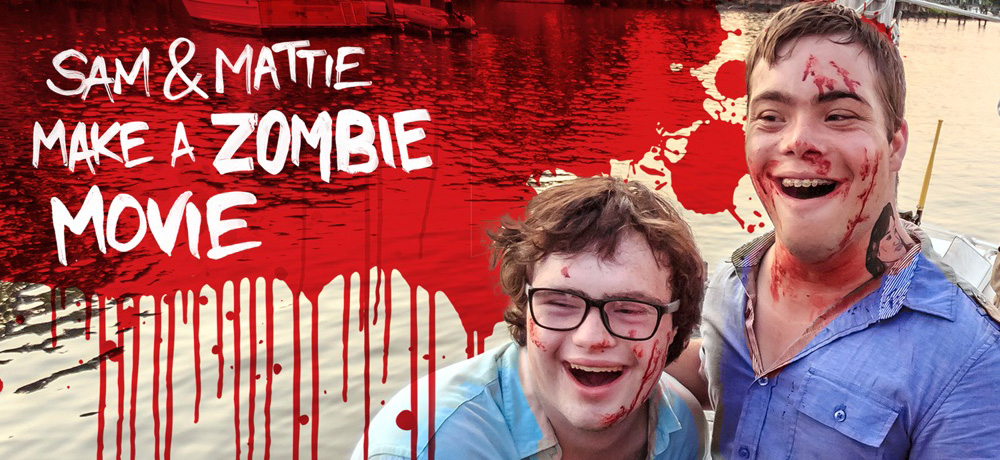






SAM & MATTIE MAKE A ZOMBIE MOVIE: "Providence, RI -- What happens when two best friends with Down syndrome rally their hometown of Providence to help realize their dream of making a horror film? The documentary Sam & Mattie Make a Zombie Movie captures this inspiring story of unfiltered optimism and barrier breaking, overflowing with gallons of fake blood and DIY spirit. Gravitas Ventures will release Sam & Mattie Make a Zombie Movie April 6 on a number of digital and cable platforms, including iTunes, Amazon Video, Vudu, Google Play, Spectrum and Cox.
“I don’t think I’ve ever smiled more while watching a movie in my life,” says Oscar-winning filmmaker Peter Farrelly (Green Book), who serves as executive producer. “Sam and Mattie are superstars!”
Since they met at the Special Olympics, Sam Suchmann and Mattie Zufelt have forged an unbreakable bond fueled by their passion for movies. Sam and Mattie pitched their idea of the ultimate cinematic experience to all who would listen: a racy teen zombie flick they proudly proclaimed would be “the greatest movie ever,” exploding with sex, gore, and more over-the-top violence than you can shake a machete at.
They convinced Sam’s older brother Jesse and his band of filmmaking friends to join them in bringing their film to life. The only rule: the duo’s original artistic vision must remain intact. This meant Sam and Mattie would storyboard, script, produce, cast, and star in their dream project: Spring Break Zombie Massacre.
“This is just one of those magical stories,” says co-director and director of Spring Break Zombie Massacre Bobby Carnevale. “We started out thinking we’d be filming their movie with iPhones and ketchup, but Sam and Mattie’s big dreams were infectious, so everyone offered to pitch in. The fact that we ended up with such an incredible film proves that when you bring the right people together, you can do anything.”
With Jesse narrating the journey, Sam & Mattie Make a Zombie Movie chronicles the unique and often emotional challenges of this independent film production and the unexpected triumphs along the way. Living the dream finds the team launching a successful Kickstarter campaign, attracting the attention of Farrelly, and landing television interviews all over the country, including a raucous guest spot on Conan. The documentary culminates in the ultimate payoff: presenting Spring Break Zombie Massacre to the world.
Proudly unconventional, totally honest, and a little punk rock, Sam & Mattie Make a Zombie Movie spotlights an underdog story like no other. It shatters disability stereotypes and celebrates the creative power of neurodiversity. Ultimately, the film challenges viewers to reach for the stars themselves, echoing Sam and Mattie’s personal mantra: “Rock on, go wild!”"
----------
BAD WITCH: "Xander is a witch whose abuse of black magic has led him to disaster after disaster. After trying to go clean of witchcraft, Xander befriends a young loner, helping Roland with bullies, girlfriends, and other teenage atrocities.
Chris Kozlowski, Jackson Trent, Clare Lefebure, and James Hennigan star in a film by Joshua Land and Victor Fink."
---------
GODZILLA Comixology Sale: "In anticipation of today's film release of Godzilla vs. Kong comiXology is hosting an IDW Godzilla digital sale."
The sale ends on April 12th at 11pm EST and you can learn more at: https://www.comixology.com/Godzilla-Sale/page/24704

----------
Composer Alexander Taylor Discusses His Scores to Scream, Queen! My Nightmare on Elm Street and the Recent Slasher Dreamcatcher: "Composer Alexander Taylor is very well versed when it comes to the horror world. Not only because he is a die-hard fan of the genre, but also because he has worked so much in it. Some of his horror titles include The Dead of Night, Scream, Queen! My Nightmare on Elm Street and more recently, Samuel Goldwyn Films’ Dreamcatcher. In the below exclusive Q&A he talks more about working on these projects.
First off, thank you vey much for taking the time to speak with us.
Of course. It’s always nice to sit down with you guys! Thanks for having me.
-What made you sign on to Dreamcatcher? What was the initial appeal?
Well, Jacob sent me the screenplay months before they even cast the film, which is always nice. The sooner you can get a composer involved, the better. Even if we don’t touch an instrument, we can start cooking up ideas.
When I read the screenplay, I immediately realized that there wouldn’t only be a LOT of original music needed, but that it would also play an integral part in the film. Considering the world that Dreamcatcher lives in, the music had to become part of the characters, a part of the setting, and part of the story telling as a whole. It was clearly a perfect flick for a hungry composer. I love writing, and I tend to write wall-to-wall when I score, and this film called for that.
Plus, it was very clear from the initial script that this was a love letter to 90’s horror. Growing up in the 90’s, I was a humongous fan of Scream. That franchise is so important to me, and is honestly my favorite series. I was only like, 5 when it came out, so I couldn’t see it in theaters or anything. But I do remember watching it with my older sister and her friends. Pretty sure she got in trouble for that, but I turned out okay, I guess?
Halloween H20. I Know What You Did Last Summer. Buffy. Urban Legend. I love all of that, and Dreamcatcher really reflected lot of that 90’s horror ensemble charm in the screenplay. I had to do it.
-What sets the Dreamcatcher score apart from other horror scores?
I think our sonic palette is pretty unique in this score. Very electric and electronic. I was really indulgent with the guitar in this score, which is so so so much fun. Guitar was the first instrument that made me fall in love with music, so it was really nice to make it a prominent element of the score. I found this really cool jangly, haunting tone that dances around the entire score. We made sure to avoid the “tried-and-true” orchestral palette for something more modern and contemporary. Not that I have anything against orchestral scores; I admire all of them, honestly. We just wanted something unique and stylish.
Sure, it’s a horror score at the very core, but there is still this very slick fun injected into it. Driving synth lines and foot-tapping beats. Naturally I had to use elements from EDM, which was a genre I wasn’t too familiar with. Not a lot, mind you; just flavors here and there. I certainly wouldn’t call myself an EDM producer, but I learned a lot about it during the scoring process.
-Jacob Johnston both wrote and directed Dreamcatcher. Since the film is centered around music, did he already have an idea of what he wanted the film to sound like before you began work on it?
Oh yeah, Jacob had a very solid idea of what he wanted. He curated a playlist, giving me a clear picture of what he was looking for. It had some Chromatics, Goblin, Cliff Martinez, SURVIVE, Clint Mansell, John Murphy. A ton of stuff that I already adore, so I knew we were on the same page.
There wasn’t any EDM in the music he gave me, actually. He wanted there to be an obvious difference between my score and the real-life world of the club. My score wasn’t intended to sound like EDM music. In fact, the team was smart enough to license some incredible tracks from real EDM artists for the incidental tracks.
Anyway, he wanted something electronic, but emphasized that he didn’t want an 80’s throwback score. That’s very popular these days, still. He also specifically didn’t want brass; I remember having that conversation. That was great because it made a lot of room for my synths and bass.
Despite these directions and “auditory rules”, he gave me a tone of room to experiment and find my own voice. I’d like to think that I did.
-Do you have a favorite scene, musically, in the film?
I’m going to try to keep this spoiler free, but obvious enough for anyone who’s seen it. There is a moment right at the end of act one that catapults us into act 2. It totally changes the direction of the film, and is super surprising. It’s a very “What the fuck?” moment, and I needed the music to act as a surprise too. The cue there, titled Painted Devil, kicks in and kind of swallows the scene and viewer.
It’s very dark and unexpected, but also hauntingly catchy. It was a relatively big creative risk because it was a big moment, and the cue is not what you’d expect. When I delivered the cue, I thought for sure it would be thrown out, or at least it would take some convincing. Much to my surprise, the team immediately got it. If I’m not mistaken, the entire scene changed from what was initially planned and edited so the music was the showcase.
-At what point were you brought on to the film?
Unofficially, I was involved at the script stage, months before production. I wasn’t actually given the job until much later, after many weeks of thinking I didn’t get it. It’s a funny story.
So our sound designer was Jeffery Alan Jones. Crazy talented guy, and also a composer himself, which is crucial information for this story.
At this point, I wasn’t officially offered the gig, and honestly didn’t know if I got it. Jacob called me up for a meeting at Jeff’s place. I get there, and it’s this gorgeous, giant studio the size of a personal movie theater. It even has a movie theater sized screen on one wall. I just look around this immaculate room and see all of this gear, a glorious mixing console the size of my car, instruments, awards… I knew Jeff was a composer. I thought to myself “is this just a cruel way of telling me that I didn’t get the gig?” My insecurity knew no bounds.
As we discuss the film, they start asking me questions about the direction of the music. This goes on for a while, and after about an hour, I realized that I was scoring the film, and Jeff was doing the sound design. I was pretty ecstatic. Jeff would have been great too, but I really, really wanted it.
-What would you say is your signature sound as a composer?
Actually, that guitar tone I was talking about has been popping up in some of my work as of late. I do try to come up with a totally fresh palette for every score, but that tone is just so cool. It isn’t showcased as prominently as it was in Dreamcatcher though.
Outside of that, I think I have a pretty unconventional writing style, most likely due to my less-than-normal avenue into film scoring. I didn’t study film composition in college, and I’ve never had the opportunity to assist any other composer, so my sound is shaped by a lot of experimentation. I used to feel really insecure about that, but less so these days. I’m kind of trying to embrace it while simultaneously striving to learn more from the masters. I know other composers can likely pick at my theoretical skills, and I’m working on that. But as long as I can serve the story and satisfy the director, the listener, and myself, that’s mainly what I focus on.
I also try to bring in a lot of influences from non-film music, too. Bands like Nick Cave and the Bad Seeds, Tom Waits, Leonard Cohen, Radiohead, David Bowie, TV on the Radio… they’ve all sculpted my sound too.
-You also scored the horror documentary Scream, Queen! My Nightmare on Elm Street. You wrote this score over a period of two years, why did it take so long?
That was due to the fact that I started too early. There were so many changes to the edit during that time that I had to write and rewrite so many cues. I always specify that this was my fault, and not Roman or Tyler’s (Chimienti and Jensen, Directors). They are perfect, and I love them. They wanted me to wait until closer to the final cut, but I was just hungry and excited to write. And like I said earlier, I just loved Roman and Tyler, so it was a great excuse to force them to hang out with me.
Another reason it took so long was that the doc was continually evolving. We thought we had a final cut a few times, but then some new interview would come in and completely change the doc. Blocks would move, get longer or shorter, or be cut entirely, and the music had to change with it.
That’s the only reason it took that long. I actually have a quick turnaround compared to most people. When I write, I don’t tend to toil and agonize over everything. Plus, I know my rig very well, and I produce as I go along. For example, it typically takes me about 4-10 weeks to score a feature. Never any longer than that yet.
-You have 10 upcoming projects on your IMDB page, a lot of them horror films. Which one do you think might be released next? Can you talk about any of these?
The Dead of Night actually just came out last week, and the soundtrack just came out today! That’s a cool one. A meticulous slow burn, for sure. Southwestern desert horror. I love it.
Isolation is an awesome covid anthology horror flick coming out in July! Nine different tales about Covid, and I was fortunate enough to work on a segment with Andrew Kasch. I love that dude. That was a ton of fun! And that poster! Christopher Shy is a genius.
Shot in the Dark is an incredible indie horror flick as well. Very unique, humanist flick; like a dark love story. And I’m so pumped to share that score when it comes out. Not sure when though.
I’m about to juggle a couple projects at the same time, which is funny because the pandemic slowed me down a bit, but now I’m drowning. Time’s Up and SoVam.
Time’s Up is going to be a blast. I just got a rough cut, and it’s already looking great. A slasher about a masked Father Time going around slicing people up with a scythe on New Year’s Eve… What’s not to love? It’s got a great team around it, too. Damian Maffai (Haunt, Wrong Turn, The Strangers: Prey at Night). LC Holt (You’re Next). Hannah Fierman (V/H/S). Felissa Rose (Sleepaway Camp). That’s another good poster, too. I love a good poster.
I’m so pumped for So Vam too. It’s this incredible queer coming-of-age vampire flick out of New Zealand from a very talented up-and-coming director named Alice Maio Mackay. The score is going to be very catchy. At least, that’s the plan for now.
-We heard you are a big slasher fan. If you had to pick between Scream, Halloween or Nightmare on Elm Street what would it be?
NO! You can’t do this to me! They all mean so much to me for vastly different reasons. The score for Halloween is a major reason I wanted to become a horror composer. I would annoy the hell out of everyone in my family and play it on any instrument I could find when I was younger. Just ask my step-mom. And I just love the entire series, and I accept ALL TIMELINES. And Dr. Loomis is my favorite character in horror history.
The Nightmare series is also very near and dear to my heart because of my work with Roman, Tyler and Mark. That entire experience is something that I will never forget. Once I went to a signing with Mark, the Dream Warriors, and a bunch of the other Springwood kids. I had a bit of a cry when Mark leaned over and told me that I was a part of that franchise’s history now. That really blew my mind.
And Scream… like I mentioned earlier, that’s my favorite franchise. Not only because it satisfies horror nerds feeling of superiority with all of it’s references, but also because it’s just the most consistent. No other series comes close. The same core cast. The same director. The same production designer. The same composer. The same cinematographer (after the debacle towards the end of Scream). The same writer (save for Scream 3)… I just love everyone involved, and even though Wes is gone, I still think the new one will be a great addition to the series. "
Alexander’s score to Dreamcatcher is available now, digitally.